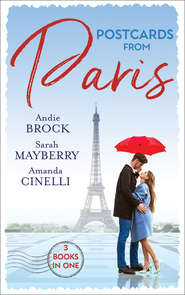По всем вопросам обращайтесь на: info@litportal.ru
(©) 2003-2025.
✖
The Christmas Wedding Quilt: Let It Snow / You Better Watch Out / Nine Ladies Dancing
Автор
Год написания книги
2019
Настройки чтения
Размер шрифта
Высота строк
Поля
Fifteen minutes later they sat down to a lunch of creamed tuna on egg noodles, and hot baked peaches topped with brown sugar and coconut. Brody looked as if he’d been invited to dine with the Iron Chef.
“Where did you learn to do this?”
She tried to ignore how wonderful it was to see appreciation in his eyes. She tried to ignore the fact that his praise seemed to be about more than a good hot lunch.
Unsuccessful.
“As a teenager I learned to make meals out of next to nothing. Sophie didn’t cook, so I had to learn or grow up on peanut butter sandwiches. Once I was out on my own I thought I would probably never cook again, but I discovered I missed it. So now I take lessons for fun, whenever I have the time.” She paused. “Which isn’t often.”
“I’d love to see what you could do with real food.” He looked up, as if he realized that sounded like he was asking for an invitation and wanted to hurry on to something else. “If the Millers get wind of this, you’ll be asked to cook every meal whenever you visit Hollymeade.”
“No telling when I’ll get here again.”
He took a second helping of peaches. “You must be incredibly busy, because I know you love this place.”
She found herself telling him about her job, and then about the trip to Hong Kong, where she had carefully inched her way through negotiations for a whole new technology system that she still believed would have ramped up the corporation’s productivity by more than ten percent.
“I missed my aunt’s funeral so I could bring that deal to conclusion, and after all that, I failed,” she finished.
“You failed, or the deal failed? Because those are different, right?”
She realized how relaxed she was and, despite everything, how easy it was to talk to Brody. “You’re right, the deal failed. Basically they used us, mainly me, as consultants, with no intention of buying our services. I didn’t give anything away, which is a victory of sorts, I guess, but I left empty-handed. I’m not used to losing, and my boss is making it personal. So I decided to come here and wait him out. When he’s done ranting and raving maybe he’ll see how valuable I am and apologize, or at least stop blaming me.”
“If he doesn’t?”
She shrugged, because getting this far had been the first hurdle. She wasn’t quite ready for the next one. “Tell me about the vineyards.”
“We still grow grapes for juice, but I’ve managed to expand into wine. Reisling first, then several others. Now I’m working on a boutique ice wine made from Reisling and Vignoles grapes, but it’s not ready for market. My Reisling won an award last year, but I can’t produce enough to make enough money to produce more.”
He said the last as if it was a joke, but she thought it probably wasn’t. Brody had dreamed of making wine all his life. He had planned to start his career at a large California winery and learn from the wine cellars up. Then he had planned to come home and establish his own vineyard.
“Did you get a job outside New York after college, the way you’d planned?” she asked.
“I decided to come home.”
She wondered why. Had there been a girl waiting, someone she hadn’t known about? A local girl ready to settle down and have his children? Because he had wanted a family. She remembered that all too well.
If there had been someone, apparently the relationship was over.
“I’d better get back.” Brody got to his feet and carried his dishes to the sink. “Thanks for lunch, Jo. It was great.”
She walked him to the door and waited while he shrugged back into layers of warm padding, finally slipping on his boots.
“Once the roads are clear you can just give me the key to the Grants’ house,” she said once he stood. “Mrs. Grant said she would see about getting me one.”
“It looks like this system’s on its way out, so I’ll be plowing like mad for the next couple of days. I won’t get to their driveway right away, so you won’t be able to drive over. Let’s just plan to go again later this week on my sled, if that suits you. I don’t mind. I’m keeping an eye on a possible leak in their roof, anyway.”
At the Grants’ house she hadn’t noticed Brody looking skyward even once, but she nodded. “I’ll see you then.”
“Unless the snow keeps coming, I’ll plow your drive tomorrow or the day after. I’m in the phone book if something comes up.”
“In the meantime at least I won’t be rationing candy bars. Thanks again.”
He smiled. They couldn’t seem to break eye contact. Jo’s heartbeat quickened, and her temperature seemed to rise despite her proximity to the door.
“You never said when you’re planning to leave,” he said at last.
“I haven’t decided.”
He lifted his hand and lightly touched her cheek. “There aren’t many places prettier at Christmastime.” Then he turned, and in a moment he was gone.
She could manage only one intelligent thought. Hollymeade suddenly seemed much too large and rambling without him.
CHAPTER FOUR
TWO DAYS AFTER the picnic-basket delivery, Jo woke to the noise of a snowplow, only this time in her driveway. By the time she threw on a bathrobe and ran to the window, Brody was chugging back down her driveway in a monster-sized pickup with a front blade that tamed the mounds of remaining snow as he made his way to the road.
She was free!
After she turned up the heat, she snuggled back under the covers. While she waited for the temperature to rise she stared at the ceiling and made a grocery list. Canned stew and beans had filled her stomach, but now she hankered for a real meal. Chicken, maybe, or a pork roast. Something she could eat right away, then enjoy leftover. Fresh vegetables, too, and fruit. Cheese.
She could hardly wait.
An hour later she was ready to roll. She wore her own jacket with jeans, but she pulled on Kaye’s snowmobile boots. Her own boots were ruined. If Kanowa Lake had anything resembling a shoe store she would treat herself to winter boots. And real gloves. Maybe even a scarf, since the ones in Hollymeade’s coat closet were awfully bedraggled.
Not a warmer jacket, though. A jacket meant she planned to stay long enough to need one. And, of course, that was silly.
Right before leaving she checked her smartphone, which was getting service again now that the storm had ended, scanning through the list of phone calls and texts she had received since yesterday. Her ringer had been off since she arrived, and she was checking both phone calls and email at her leisure. She skipped everything from her boss, read some emails from coworkers, and texted an acquaintance who was worried about her.
She noted one call from what she thought might be a Florida area code, but there was no message. Tossing the phone in her handbag, she headed for the door.
An hour and a half later she had groceries from the town supermarket, and boots and gloves from the Trading Post. The Trading Post was so named because it was purported to stand on a site where the Seneca people had once gathered to trade goods. The store had a bit of this and that, and today “that” had included an assortment of brightly colored scarves. But, Jo had reminded herself, she could stay warm with moth-eaten wool just as well as with the bright turquoise scarf from the Trading Post.
She was ready to drive away, when she slapped her palm on the steering wheel, went back inside and bought the scarf anyway.
Kanowa Lake had changed since her adolescence, but not a lot. There were too many For Rent signs in store windows. The shopping district was only two short blocks, and only half the stores and restaurants were still open, although some would resume business when summer arrived.
The town administration knew that tourism was their friend and somehow, even in the face of recession, had managed to keep the downtown spruced up and ready for visitors. The stone church at a prominent corner had been recently sandblasted, and a sign thanked donors to the project. The bandstand in a spacious park had been freshly painted and was now strung with Christmas lights.
Since she was standing on a ridge, she could see the lake beyond. Piles of fluffy white snow extended out toward the center, where the water hadn’t completely frozen and now glinted bravely under the sunlit sky. She knew exactly what the lake looked like in summer, but this view, lovely in its own way, was new.
She compared her shopping trip with the one she might have made in San Diego. There she would have had dozens of stores to choose from, and after patiently navigating traffic to get to them, parking and waiting in lines to pay, she would have ended up spending many hours and dollars. Of course, for her effort, she would have found exactly what she was looking for, in the colors and materials she wanted, and sizes that fit perfectly.
Today she hadn’t been shopping for anything special. She had needed gloves, boots and a scarf, not a wedding gown. She had finished quickly, and she was already wearing the boots. Plus she had heard all about the upcoming winter festival from the woman who had waited on her—who couldn’t have been more friendly.
As she walked back to her car other shoppers smiled and nodded. Somebody exited the diner, and just before the door closed she caught a tantalizing aroma. Apple pies baking, she guessed, for the upcoming lunch crowd. She was too early for lunch, and now she was sorry she hadn’t shopped later. A small town had its own pleasures, different from city pleasures, and she was falling easily into Kanowa Lake’s rhythms.
She had hoped to find a quilt shop where she could find a pattern for her border, but there wasn’t one here. This was no problem, because she had remembered there were hundreds of books upstairs in one of the attic bedrooms. It was entirely possible that her grandmother or Aunt Glo had left some of their quilting books to use during their summer stays. The moment she got home she would look.











